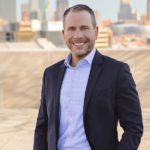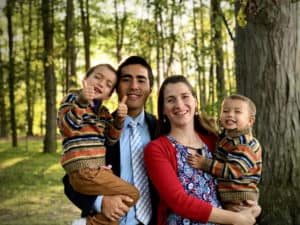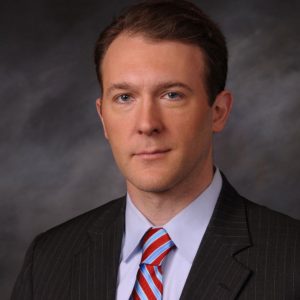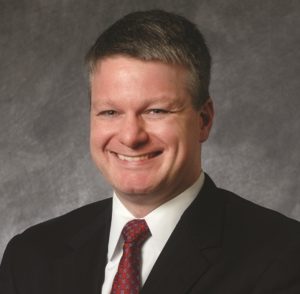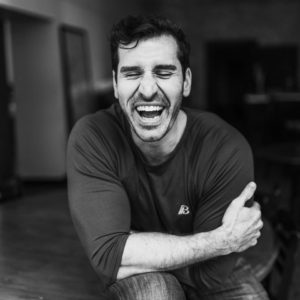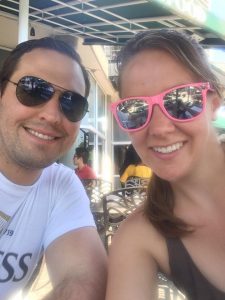Clint mainly serves Generation X clients with an emphasis on truly comprehensive financial planning. As Clint says “We strive to serve those individuals who want and need a real financial plan for their future.”
Clint is also the creator of The Financial Freedom Blueprint®. This is NextGen Wealth’s trademarked and proprietary financial planning process that they go through with their clients.
Denis O’Brien [1:6]
Welcome to Episode 210 – Clint from NextGen Wealth. Hey money clan, a warm welcome to the Chain of Wealth podcast. I’m your host, Denis O’Brien,
Katie Welsh [0:49]
And I’m Katie Welsh,
Denis O’Brien [0:50]
So Kate really fun conversation we had with Clint, and he unlocked a ton of value for me.
Katie Welsh [0:56]
You know, I always feel like whenever we get a chance to sit down with a financial planner, it’s kind of like being best friends with a doctor.
Denis O’Brien [1:5]
You get all the benefits.
Katie Welsh [1:6]
Well, like, whenever we are out with like, we don’t have a ton of Doctor friends. But when we have we have one or two. So whenever we go out, I’m just kind of like, you know, like, what about this? or What is this happened? And I just have like, all these questions and it doesn’t have to be like, Oh, my elbow hurts. Like, do you think you have to cut my arm off like
Denis O’Brien [1:26]
Yeah.
Katie Welsh [1:26]
I just don’t know like, kind of like scenarios. I want to pick your brain. So that’s how I feel with financial planners, too, because I just want me to tell me what you know. What do you know?
Denis O’Brien [1:38]
Yeah, I totally agree. And just before we do dive into today’s show, we are looking to hear what your thoughts were on today’s episode. So definitely DM us. It’s @chainofwealth on Instagram. Let us know what you thought of today’s show. And if you have any money questions, don’t forget to let us know what your questions are, as well. Alright Kate you ready to dive right in.
Katie Welsh [1:59]
Yeah.
Denis O’Brien [1:59]
Fantastic. Let’s do it.
Voice Over [2:2]
Welcome to Chain of Wealth. here’s your host, Denis inspiring you to begin your journey of financial freedom.
Denis O’Brien [2:15]
Clint Haynes is a certified financial planner and the founder of NextGen Wealth. He’s been in the financial services industry since 2001. Working for both large wire houses, to regional firms to now owning his own financial planning practice. Clint mainly serves Generation X clients with an emphasis on truly comprehensive financial planning. As Clint says, We strive to serve those individuals who want and need a real financial plan for the future. Welcome, Clint.
Katie Welsh [2:47]
Hey, Clint.
Clint Haynes [2:49]
Hey, Denis and Katie. It’s great to be here.
Katie Welsh [2:51]
So good to have you. And we got well you and Denis got to meet at Fincon. I sadly was at work. But, uh, can you tell us a little bit about you?
Clint Haynes [3:3]
Yeah, absolutely. So I am a Certified Financial Planner, as Denis mentioned, personally, just to give a little background, I am been married for about almost 11 years now. And we just had our first daughter Harper, who is almost eight, eight months old now. Yeah, yeah, she is, she’s awesome. She’s super laid-back easy going, at least that’s what people tell us. And but now, I mean, it’s been, it’s really been a blessing. And it’s something that we’ve, you know, have been trying for seven, eight years. So it’s definitely been a journey for sure to have on our lives, which is super awesome. And then as far as, you know, professionally, I’ve been in the financial services industry since 2001. And, as Denis mentioned, in my bio have been with big wire house to regional firm to another regional firm, and then kind of had this epiphany in 2011 ish, when I was in my younger 30s of, you know, I just kind of felt like, all of these firms out there, were all catering towards the same exact client, they all were looking for, you know, individuals who were getting ready to retire, or who were coming into a lot of money. And I thought, you know, I know a lot of people who are around my age maybe doesn’t happen, don’t have a whole lot of money right now. But they, they certainly probably would, at some point, but they don’t need help with their investments they need help with, you know, other things in their personal financial lives. And I just kind of thought, you know, the, the industry is really kind of backwards, it shouldn’t be, we figure it out for yourself for, you know, the first 30 years of your professional career. And once you have a bunch of money, then we’ll help you out. It should be, why don’t we help you out when you don’t have a whole lot of money to get you going in the right direction. And then, you know, once you do, obviously, will help you out. But it just, it just seemed like it was a little bit backwards. And so that’s when I started NextGen Wealth and about 2014, to really try to help that younger clientele, who maybe wasn’t a great fit for a lot of the bigger firms that many of us have heard of out there today. And that’s, that led to kind of what we’re going to be talking a little bit about today, our financial planning process, which is, you know, we kind of trademark the financial freedom blueprint.
Katie Welsh [5:30]
So Clint, I’m curious to know, because I always like to hear from professionals, where are younger generations, kind of going astray in their savings and retirement plan?
Clint Haynes [5:45]
Yeah, I don’t know any, if, if there’s one place that they’re going astray, I think it’s more more lack of education, just in our country, in general, when it comes to personal finances, you know, unless you have a parent that is really good about educating you about personal finances and against about budgeting and cash flow and what you should be doing. You’re not taught about it in high school, and you’re really not taught about it in college. So it’s really kind of up to you to figure it out for yourself, which, you know, certainly isn’t the right way to go about it, in my opinion. In so there’s not really one certain place that they go astray, I think it’s more just lack of education and not knowing, you know, what I’m supposed to be doing for, you know, for I think a lot of people you know, they have they know enough to be dangerous, but they get to a point where it’s like, I don’t know, what should I be? Should I be putting money and saving money in my emergency savings account? Or should I be paying down the student debt? The student loan that I have? Or should I be putting money in my 401k? right now. So a lot of these kind of common questions that are out there that people are thinking, they just don’t really know, how they should prioritize what they should handle first.
Denis O’Brien [7:6]
Right. That definitely makes sense. So say, I am said individual, which, you know, I don’t really have much of a plan
Katie Welsh [7:13]
I have the same question.
Denis O’Brien [7:14]
I’m going along my life. I just trying to figure stuff out. And now I’m sitting across the table from you. And I’m asking, What is this financial freedom blueprint that you’re talking about? Like, how would you sort of go about explaining that process?
Clint Haynes [7:28]
Yeah, absolutely. So the financial freedom blueprint is really just the the name of our financial planning process that we use with our clients at NextGen Wealth. And so the way that I would explain it is, you know, for most financial planning firms, you know, investment management firms that are out there, it’s really investment focused, like we want to, they’re going to try and help you with your investments. But a lot of people who are in their 20s, and 30s, like, they just don’t have a whole lot of investments to work with yet. So they don’t need a whole lot of help with that. Right now. They need help with other areas of their financial life. And that’s where the financial freedom blueprint comes into play, as we’re really looking at every area of an individual’s personal financial life. Such as, you know, very important ones are the you know, the biggest one by far is, what is it you’re trying to accomplish? You know, what is it you want to achieve in your life? And what are the goals you want to achieve when it comes to, you know, not only personally when it comes to finances, but also, you know, personally in your life and professionally, like, let’s start there to figure out what those are about? And then we can kind of craft Okay, how much do we need to be saving? And what is your cash flow? And what’s coming in? And what’s going out? And how much should you be putting in an emergency savings account? And if you have debt? And how should we handle that? And, you know, looking at all the way to what credit cards do you use? And can we find better ones that maybe will get you a little bit better cash back to even tax planning and saying, Hey, have you thought about if you have kids, you know, maybe this dependent care flexible spending account where we can save taxes there. So literally just trying to think of all these different areas that people are working with, and their financial lives, they just haven’t thought of before. So it’s really about trying to save them as much money along with trying to, you know, help them make a little bit more money as well within their financial life.
Denis O’Brien [9:28]
Right, so what sort of horizon in terms of like a timeframe, do you find that most your clients are focusing on? So it could be like maybe a one year or five year sort of immediate financial state of mind that they’re in? And how long term should people really be looking?
Clint Haynes [9:45]
Yeah, I mean, that’s a great question, Denis, really, really the only one long term goal that we have for our clients is, you know, retirement, or, you know, whatever they want to call it, financial independence, financial freedom, basically, whenever they don’t have to worry about having a paycheck anymore. And that could be for most of our clients, anywhere from that 10 to, you know, 30 years away, depending on how long they want to work, and you know, how much they like their job. So, but other than that, we really try to focus on those goals that are, you know, five years or less and listening to know we’re talking about children’s education, which might be 15 18 years from now, just because, you know, I think professionally, it’s really difficult to set goals that are three years plus, because I even looked back at myself and think, man, I can’t believe you know, this is where I man, this is where I’m at right now, three years ago, or five years ago. And I mean, my gosh, 10 years ago, I had no idea I’d be right here, right or wrong. But it just, it’s really hard to predict and set goals where we going to be within those timeframes. And so, you know, certainly we focus on, you know, a couple of those long term goals. But really, it’s more, you know, what do we really want to be a year from now, and what are the habits that we need to set for you, in order to get you to start, you know, saving enough money or opening up another account, and earmarking money for whatever that goal may be, whether it’s, you know, saving for a down payment on our house, or a dream vacation for the family, or a new car. So everybody kind of has their own goals and what their trying to accomplish, really for us, we want to try and get that out of them. So they can talk more open about it, and really line it out, and then come up with a plan in order to get them there.
Katie Welsh [11:40]
So Clint I have a little bit of like a around about question, that I’m gonna try to phrase that the best way they can. So I feel like young people have at least friends that I have known and co-workers and people that I have known personally, mindsets are always towards, you know, moving out and getting an apartment, going out with my friends, happy hour dinners, new clothes, vacations, all that stuff. And it doesn’t seem like the majority of people are thinking, you know, I’ve got my first paycheck out of college, and I want to go talk to a financial planner. So what does it look like to go to a financial planner? Like how much does it cost? Typically, how like, what kind of shy bring papers with me like, do I What do I bring? I don’t I don’t know anything?
Clint Haynes [12:36]
No, that’s a great question, Katie, it. I’ve never met anybody. That’s, that’s gotten out of college and said, I need to go talk with somebody about their finances. That would certainly be the exception. And it sounds like they should probably be a financial planner.
Katie Welsh [12:54]
And think of what a much better place that we all would be if we did come out of college thinking that way.
Clint Haynes [13:0]
Yeah, exactly, exactly. So there’s usually some kind of trigger that points somebody in the direction of talking with a professional and talking with a financial planner, and so who knows what it might be, it might be, you know, they have the student loan debt, it’s becoming really a burden. And they just, you know, they need to do something, and they need to come up with some kind of plan. It could be they got married, it could be they had a child, it’s really this kind of these life trigger events that cause people to reach out to somebody else. It’s not they just don’t wake up someday and say, Man, I think I want to talk with a financial planner. Like Nobody does that, you know, as much as I wish it was the case, it’s just not the case. It’s usually something that’s triggered them to do it. But also, you know, you know, we’re going to talk about it today. That’s, that’s why, you know, we created this, this kind of DIY financial planning course, the financial freedom blueprint course is because a lot of people don’t need a financial planner, a lot of people can, can do it themselves, they just need a little bit of direction, and guidance on where it is they need to go and what it is they need to be doing in their personal financial life. And thus why we created this course to kind of help those individuals who, you know, may never need a financial planner may never need want to pay for a financial planner, but they just need kind of a some guidance and planning to get a good financial plan in place.
Denis O’Brien [14:29]
I definitely agree. And, Clint, we were speaking a lot about it when we were chatting at Fincon about this, you know, like, some people are in the boat where you know, the situation is dire, they want to see someone face to face, and they need someone to hold their hand and walk them through every step of the way. But not everyone’s wired like that a lot of people want to do the research themselves. And that’s why something like your financial freedom blueprint course makes so much sense. Because me as someone that is, you know, trying to figure out my way in the world with finances, I may not know everything but there is this course that has basically taken a whole bunch of information about a variety of topics and simplified it for me and given me a path that I can go through at my own pace and address certain chapters as in when they are applicable to me. And I really think that what you’ve created as a really, really cool.
Clint Haynes [15:20]
Yeah, and that’s, I mean, that was the whole reason that I created this in the first place is because I feel like, in today’s day and age, there’s so many more people that are comfortable going that DIY route. And that’s just because there’s so much more information available and out there than there was 15 20, you know, even 10 years ago, like, there’s tons of information you can find on the internet, if you want to do it yourself. But with that comes, there’s a lot of noise too. And so you’re really trying to find, you know, that signal within all the noise, to make sure that you’re doing the right things, and that you’re following the right people. And, you know, with me creating the course it was, we’ve done this for, you know, hundreds of different clients and took taken them through it and have kind of fine tune this over the years. And finally gotten to a point where, you know, being off my goal is for a couple years of putting this course together, finally put it together. And it was really designed for somebody who, you know, it wasn’t a stepping stone for them to become a client of NextGen Wealth. Because I get that question quite a bit if you know, do you think it’s going to cannibalize, you know, clients or anything like that? I said, No, absolutely not. Like there’s so many more people that kind of enjoy doing this, you know, personal finances themselves. They kind of like doing it and figuring out things for themselves. And, and probably don’t even you have the need for hiring somebody or paying somebody. And that’s exactly who this course was designed for. Are for those individuals. Yeah, maybe if they need to work with a professional at some point down the road. That’s great. But this course wasn’t designed to help me grow my firm, it’s designed to help the DIY, or, you know, have a good foundation that’s built on, you know, experience and take them through step by step exactly what they need to do in order to create their own financial plan.
Katie Welsh [17:15]
Yeah, well, I like, I’m just going to piggyback on both of you guys, because I like the idea of an online course. Because, like you said, the course takes all the noise, like every like you could Google anything nowadays. But the problem with googling is having to sift through the websites that are reliable and trustworthy. And the ones that could be a little bit questionable. And I also think like Denis said, Generation X, like, they’re used to having to Google and research things online and everything. So I think for people coming up, this is going to be like the next like, kind of new wave of, you know, you want to learn something quick. Take a course online, you can go at your own pace, you can refer back to it and everything. So I wanted to know what kind of topics are in your course, what are some of the things you touch on the most?
Clint Haynes [18:17]
Well, we cover a ton of stuff in the course curriculum. So it certainly can be a little overwhelming if you just take a look at it. So I’ve broken it down into 25 different sections. And two of those are the intro and the outro. But other than that, it’s it is, you know, it is meat all the way through and through talking about, you know, starting a cash flow. And what we’re really starting at goals first and figuring out what those goals are and getting those down on paper and figuring out what it is you’re trying to accomplish and what you’re trying to save for. And then talking about cash flow and what’s coming in and what’s going out. And then talking about you know, how can you spend less on things that you’re probably already buying, or make more money with, you know, there’s a number of different avenues, how you can make more money in today’s day and age, to talk about saving money for retirement and your employer match if you get an employer match, to paying off debt and savings. And we talk about homeowners insurance and auto and how to save money there, and health insurance and taxes and estate planning credit card. So, I mean, we cover the gamut, when it comes to just about everything you could ever think of that would be applicable to your financial life. And, and really the you know, the first I would say, seven or eight sections, you kind of want to go step by step. But a lot of those other sections, you can pick and choose if you have, you know, if you want to, you know, go into them, because a lot of them, especially, let’s say the insurance sections, we give a ton of tips on how you can save money on your homeowners or auto or life insurance that people may have never heard of before. But maybe they have but they just they just haven’t had the time or the nudge to actually pull the trigger. And especially, you know, savings account, I would say, I don’t know 95% plus of the clients, we see at NextGen Wealth, their savings account is just sitting at their brick and mortar bank, and it’s paying them almost zero percent or less than point 05. And we take 10 minutes, and open up an online savings account and get them you know, 40 times the return for 10 minutes of their time. So this course isn’t just about creating a plan. It’s about helping them save money and make more money on things that they’re already doing as well.
Katie Welsh [20:46]
What I heard you say is basically everything that we should have learned in high school or college.
Clint Haynes [20:54]
That’s exactly right. This is your personal financial planning 101 course that you probably should have got in the senior year or freshman year of college,
Katie Welsh [21:4]
I can attest for a long time I had my savings account in a no interest savings. So I’ve been there.
Denis O’Brien [21:13]
Well. The thing is like it’s called a savings account. So a lot of people get confused by the terminology. I feel it is misleading, misleading ever.
Clint Haynes [21:24]
Yeah, you save money at it. But you also should try it and maybe make a little money.
Denis O’Brien [21:27]
Yeah, exactly. So Clint, how much does this cost typically set people back?
Clint Haynes [21:32]
So give you a little background. At our firm NextGen Wealth, we charge $2500 upfront fee to go through this process with our clients. And obviously we we handle a lot of it for them. And that’s why they’re paying this premium price. But when creating the course and kind of testing out different price points that would resonate with that DIY individual who enjoys doing it themselves, and also is very cautious about how they spend money. We came up with a $397 price point. And the I guess the way that we arrived at that is with the 2500. Most of the time, we can we can make that back relatively quickly. And for compliance purposes I can’t guarantee anything. But with 2500, we typically make that back for our clients within a six month time frame just with, you know online savings account or saving money on their insurance that they’re already buying, or saving money on taxes. So with the 397, we feel even more confident that they can make up the cost of the course in no time at all, just from just from a few of the tips that we give away. But for you guys, you know for when this goes live, or we will offer a $200 off coupon for the first seven days. So if somebody signs up for the course, I’ll give you a coupon and it’ll be in the show notes as well. Where you can take 200 bucks off, it’ll be $197 for the course. And you can use it and make sure you sign up within that seven days and when the course go or when the show goes live. And you can get the whole thing for 197 bucks. And I mean, obviously I’m biased, but I feel like it’s a great deal. And granted, we’re not doing it for you. But we show you exactly what you need to do. We’ve got templates, we’ve got videos, you have a financial freedom blueprint template that you follow all the way through and you fill in after each section. Each section also has its own template that you follow along with the video. So I really try to make it just as easy as possible so that you don’t just you know, you don’t just sign up for it and do nothing at all, like that’s, that’s not the point at all, the point isn’t to, you know, to sell you on this course, the point is to get you to take action. And that’s what I want to happen. If you do purchase this course.
Denis O’Brien [24:1]
Money clan and we’ve set up an awesome pre-links, you can easily get to the page as well. If you go to chainofwealth.com/ffb, it’ll take you directly to the course page. And if you use promo code chainofwealth1 that’s chainofwealth1 on the course you will unlock that $200 off. So definitely don’t delay, check out the course, it’s a really good price for what the product is. And on that note, we’re just gonna take a quick break and say a very big thanks to our sponsor. Money clan, Kate and I have recently started growing our Instagram following. It’s @chainofwealth on Instagram. And we’re also giving away free stuff sometimes if you are a lucky person. So hit us up on Instagram, we’d love if you would dm us, let us know what you’re enjoying about the show. It can be a photo of the current episode that you’re listening to, or just a photo of general or whatever it is, we would love to hear what you enjoy about listening to Chain of Wealth, that’s @chainofwealth on Instagram.
Katie Welsh [25:8]
Okay, Clint, so I am curious to know what your retirement plan looks like, Where are you putting your money?
Clint Haynes [25:18]
Yeah no absolutely.
Katie Welsh [25:19]
You need a podcast to ask these kinds of questions. We go for it.
Clint Haynes [25:25]
Yeah, so no, I I invest right along side of the same investments as my clients, you know, outside of, 401 K’s and things, you know, through my business and through my wife’s business, but I’ve invested in the exact same funds. So I’m a big proponent and believer of philosophy that a company by the name of Dimensional Fund Advisors are DFA. And they’re kind of exclusive through the advisor space. But it’s a similar platform to Vanguard. So if I was an advisor, I would you know, hundred percent be in Vanguard funds. And it’s not like one is better than the other by any means. So I invest exactly the same way as my clients in the same funds. And, you know, certainly wouldn’t feel right, if I were doing something completely different, which I’m sure happens a lot. So that’s my plan for retirement. And just, you know, I’ve gone through the course, you know, many times, and my wife and I have a plan in place for what it is we’re trying to accomplish. And she’s much more conservative than I am. So I’m always wanting to take risk. And that’s why I started a business and she’s always willing to put money into savings accounts. So we’re no different than anybody else. Even though I do this for a living. It’s still tough for me. I’m much better at telling people what this I think anybody in life is, you know, a doctor or whatever, like, you’re much easier telling people what to do than actually practicing it. But I also feel like I’m pretty good at practicing it to.
Denis O’Brien [27:3]
Right Well, hopefully she’s using a high yield savings account.
Clint Haynes [27:9]
Yeah, I did learn that a long time ago luckily.
Denis O’Brien [27:13]
So do you have a favorite book that your currently into?
Clint Haynes [27:17]
What favorite book am I into right now? I’m trying to think what am I reading? I mean, reading fiction right now, I always switch between fiction and nonfiction. And I’m actually reading fiction right now Brad, Thor is the author. It’s really just kind of an action writer, and just fascinating. And you can, you know, run through these books. So I would like to switch back and forth and, you know, kind of go into the self help type things. But let’s see, you know, big ones. For me, our Influence was a huge one by Robert Cialdini, that one is definitely memorable to me. Just anything on deliberate practice to a number of books out there that are on deliberate practice, and it’s kind of saying, you know, these are the things that you need to do in order to be successful, nobody’s born successful. And it takes a lot of practice and a lot of hours. So I think that more than anything, those types of books, just give me hope that you know, that I can do some things that maybe I don’t think I can do.
Katie Welsh [28:28]
And so do you have a favorite quote you try to live by?
Clint Haynes [28:33]
Oh, man, that is a great question, a favorite quote that I try to live by, I don’t know if it’s a favorite quote, but it’s definitely but it’s a it’s a saying in one that, you know, has been around for a number of years and one that I have certainly share all the time. And it’s Nike, it’s it’s “just do it”. I feel like there’s so many of us, my me included for a number of years and any still I struggle with this today, it’s you know, we have so many ideas, and we want to do these things. And we want things to be perfect before we before we actually release them or do them or make a change. And you know, what it comes down to is just just do it, like nothing is ever going to be perfect. And nothing ever is just going to be exactly right. There’s always going to be something but just to it, and you’ll figure out what you need to do in order to change it. Whatever those changes might be.
Katie Welsh [29:29]
I think that’s good advice. people struggle with that. For sure.
Denis O’Brien [29:33]
Yeah, definitely. So Clint we absolutely loved hanging out today. Do you have any last parting piece of advice for our listeners, and then we’ll say goodbye.
Clint Haynes [29:41]
Yeah, I would say, you know, I’m a financial planner. So I kind of start there is, you know, my my one tip today, if you get anything at all, and you don’t have to pay, you know, you don’t have to buy the course by any means you do you do you for sure. But just just write your goals down, like have have your goals written on paper, you know, it’s it’s been proven by studies that just writing your goals down, will put you 70 80% ahead of everybody else who just kind of has them in their head. And most people think, oh, gosh, I don’t want to write my goals down. That’s just, you know, waste of time, but it’s proven writing your goals down is the key to actually achieving your goals. And it doesn’t take very long. I mean, we’re talking 5 10 15 minutes just to write down, you know, some of your financial goals or personal goals or professional goals. And then even better than that is it’s proven that if you write them down and then actually review them, you’re about another 60 or 70% likely to achieve them, which puts you ahead of 95 99% you know of the people that are out there, so just take some time to write your goals on paper, whatever they are, and you’ll be ahead of the majority of people who are out there today.
Denis O’Brien [31:2]
Money clan we been hanging out with Clint Haynes from NextGen Wealth, you can check out his website or claim the offer chainofwealth.com/ffb and use promo code chainofwealth1 to unlock that $200 off his course.

